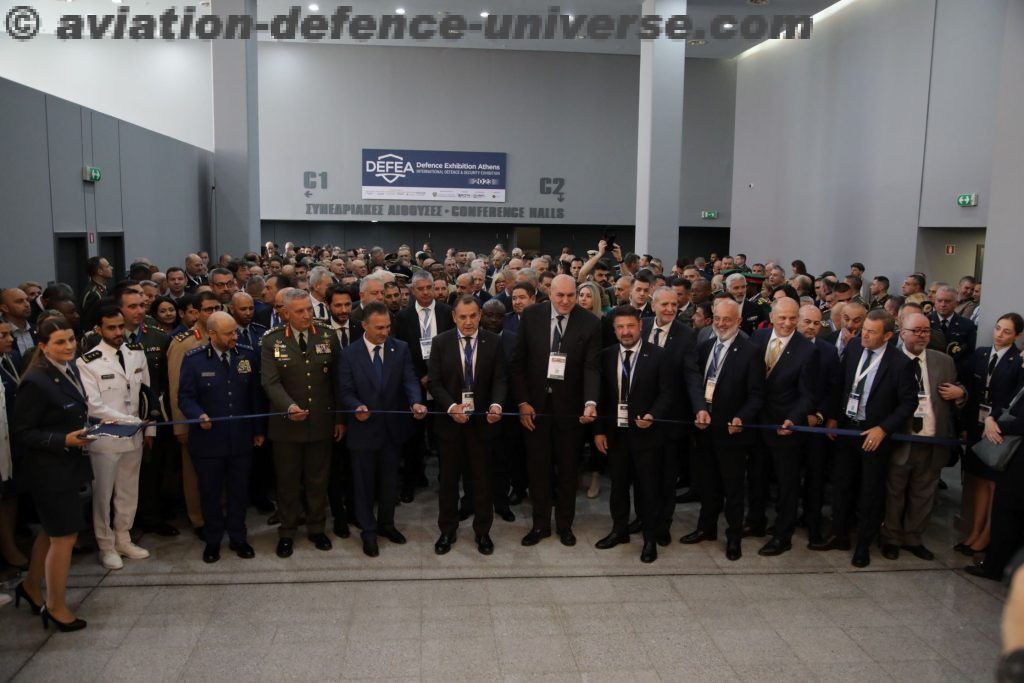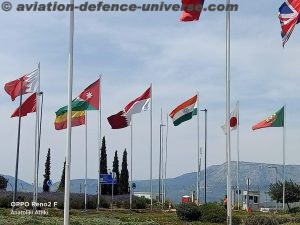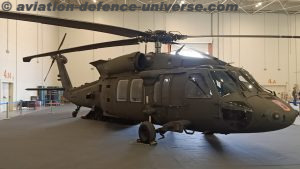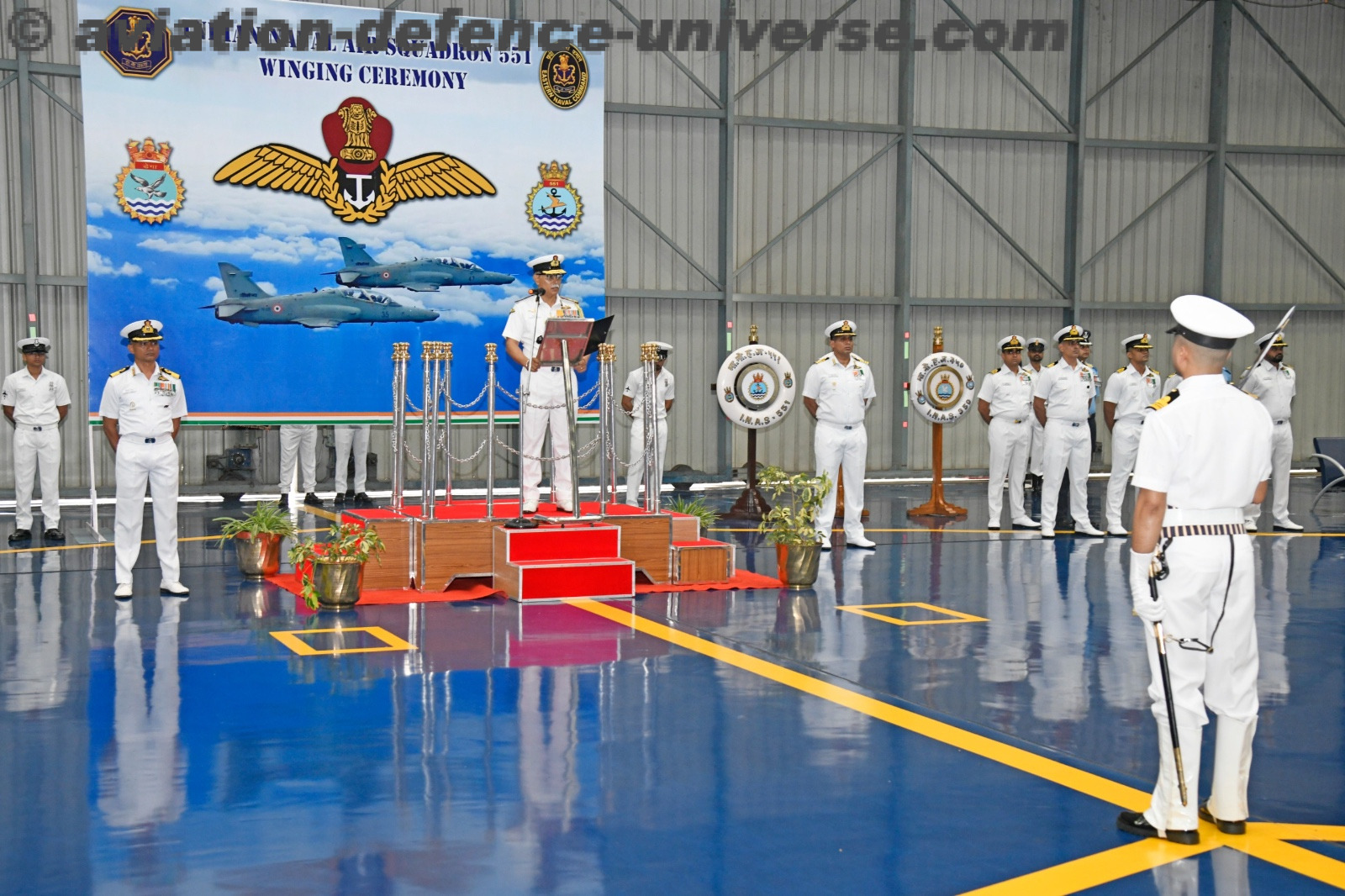
- War in Ukraine makes the Greek defence show important
- Day1 at DEFEA was a melange of delegations & delegates
By Chaitali Bag
Athens, Greece. 09 May 2023. When the Hellenic Minister of National Defence Nikos Panagiotopoulos inaugurated the international exhibition for Defence and Security DEFEA 2023 there was expectancy, importance and regional togetherness palpable . The war in Ukraine made the region just right for making the show a meeting point for the entire defence industry, facilitating international contacts, technical and geostrategic briefings and multilateral cooperation. Strategically located in Greece, one of the oldest member states of NATO and EU, DEFEA offers the ideal access to Eastern Mediterranean, Middle East, Asia and Africa, as well as Europe and USA.

In a covid free environment the DEFEA Exhibition is taking place from 9th to 11th May under the auspices of the Ministry of National Defence (General Directorate of Defence Investments and Armaments) and the Ministry of Maritime Affairs and Insular Policy and in close cooperation with SEKPY (Hellenic Manufacturers of Defence Material Association) at Metropolitan Expo exhibition centre, in Athens. 346 exhibitors from 28 countries and tousands of visitors from 78 countries, make the event cynosure of all eyes.
Deputy Minister Nikos Chardalias, as well as the chief of the National Defence General Staff General Konstantinos Floros attended the ceremony. Additionally, 32 official governmental and military delegations, 10 of which were headed by Ministers or Deputy Ministers of Defence where present as guests of honor of the exhibition.
DEFEA is focused in the Hellenic Defence Industry which make a dynamic presence with nearly hundred state owned and private industries among the total of the 346 exhibitors. Some of these factories have been founded more than a century ago and they have an invaluable contribution to the national defence of Greece.
 After the inauguration ceremony, the Minister of National Defence had consecutive meeting with his counterparts, present in the exhibition. Panagiotopoulos also attending an open discussion under the title “Greece at the Center of Geopolitical Developments” which was focused on the Raise of the Capabilities of the Armed Forces and Extroversion of the Greek Defence Industry.
After the inauguration ceremony, the Minister of National Defence had consecutive meeting with his counterparts, present in the exhibition. Panagiotopoulos also attending an open discussion under the title “Greece at the Center of Geopolitical Developments” which was focused on the Raise of the Capabilities of the Armed Forces and Extroversion of the Greek Defence Industry.
Modern battle tanks and armored vehicles from the European and American defence industry are on display in Athens . The USArmy is participating with some of the most advanced weapon systems it possesses, some of which are being considered as platforms for the Greek armed forces. Emirates Defense Companies Council (EDCC) , the national representative body for the UAE Defense industry, is organizing the UAE National Pavilion at DEFEA.
Firstly when Israel-Palestine get a cold, the Mediterranean region sneezes is the dictum. European countries in the Mediterranean Sea are Spain, France, Italy, Malta, Monaco, Slovenia, Croatia, Bosnia and Herzegovina, Montenegro, Albania, and Greece, Turkey, Cyprus, Syria, Lebanon, Israel, and the Palestine Gaza Strip and Northern African countries like Morocco, Algeria, Tunisia, Libya, and Egypt . And each of them has a leaning towards either Israel or Palestine. And this latest conflict between the two has resulted into tremors in the silent blue waters of the Mediterranean Sea.
Secondly Cyprus-Turkey maritime dispute is no secret . The Republic of Cyprus (Cyprus) and Turkey have been engaged in a dispute over the extent of their exclusive economic zones (EEZ), sparked by oil and gas exploration in the area. Turkey objects to Cypriot drilling in waters that Cyprus has asserted a claim to under international maritime law. The present maritime zones dispute touches on the perennial Cyprus and Aegean disputes. Turkey is the only member state of the United Nations that does not recognise Cyprus, and is one of the few not signatory to the United Nations Convention on the Law of the Sea, which Cyprus has signed and ratified.
Turkey claims a portion of Cyprus’s EEZ based on Turkey’s definition that no islands, including Cyprus, can have a full 200 nautical mile EEZ authorized to coastal states and should only be entitled to their 12 nautical mile territorial seas. Turkey’s definition creates a dispute over the rights to waters south of Cyprus containing an offshore gas field. This definition is not shared by most other states. Furthermore, the internationally unrecognized Turkish Republic of Northern Cyprus (TRNC), which was created as result of the Turkish Invasion of Cyprus, also claims portions of Cypriot EEZ. Cyprus and other countries including Israel, France, Russia and Greece view these claims on Cyprus’s land and sea as illegal under international law and urge Turkey to refrain from illegal drilling for gas in the island’s EEZ. The European Union has threatened Turkey with economic and political sanctions for violating the Cypriot EEZ.
Meanwhile Greece and Turkey have a dispute over sovereignty and related rights in the region of the Aegean Sea. This set of conflicts has strongly affected Greek-Turkish relations since the 1970s, and has twice led to crises coming close to the outbreak of military hostilities, in 1987 and in early 1996. The issues in the Aegean are the delimitation of territorial waters, national airspace, exclusive economic zones and use of the continental shelf. One aspect of the dispute is the differing interpretations of the maritime law: Turkey has not signed up to the Convention on the Continental Shelf nor the superseding United Nations Convention on the Law of the Sea, both of which Greece has signed up to; as such, Turkey doesn’t recognize a legal continental shelf and EEZ around the Greek islands.
Israel and Turkey too have a bone of contention – the December 2019 deal between Libya and Turkey that declared Turkey’s sea borders to stretch from Anatolia all the way to the shores of Derna and Tobruk. Israeli foreign minister Israel Katz announced Israel’s opposition to the maritime border accord between Ankara and Tripoli, and confirmed that the deal was “illegal” according to the Israeli official position, while at the same time noting that Israel does not want a conflict with Turkey. Turkish navy had driven out an Israeli oceanographic research vessel that had been operating with the consent of the Cypriot government in Cypriot waters. This act, in the context of the deal with the GNA, led to Israeli fears that Turkey aimed to “create a sea border the width of the entire Mediterranean” and cut off Israeli access international waters via the Mediterranean sea, the channel of 99% of Israeli exports.
With so much of geo-political turbulence in the Mediterranean sea, Greece has a role which mandates keeping the security of the region intact and keep the waters safe to sail past. For this it needs not only a well equipped military but also a robust security industry environment, which gives the region a manufacturing hub and creates a buyer-seller platform for the nations of the region.And DEFEA 2023 is hence a cynosure of world eyes and on global geo-political agenda.
























































































































